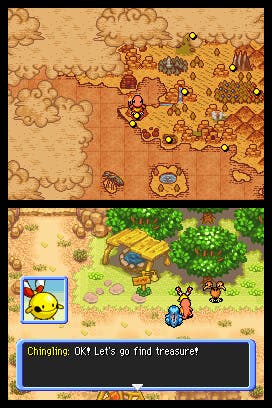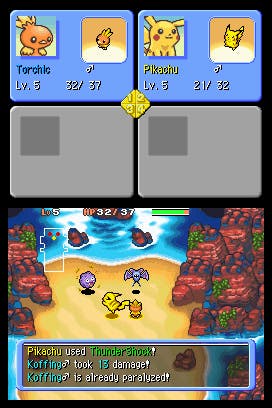Pokémon Mystery Dungeon: Explorers of Time/Explorers of Darkness review
Gotta rescue 'em all. By exploring dungeons.
Okay, so I have to declare an interest. My favourite game in the entire world, ever, ever, is a game called Rogue. It's a game created in 1980, in which you play the part of an adventurer who is represented by an @ sign. This adventurer explores randomly generated dungeons made out of ASCII characters and fights monsters represented by letters, and the game itself spawned a whole genre of 'roguelike' games - more complicated imitators that are enormously popular on the internet, where they can generally be downloaded for free.
We've been here before, of course. That paragraph above is exactly how I started my review of Pokemon Mystery Dungeon: Blue/Red Rescue Team. I could go on. I could simply reprint the entire thing here. But that would be a little bit cheeky wouldn't it? Passing off old content as new, trying to hoodwink your audience into enjoying something twice. But that's precisely what Nintendo has done with the new Explorers of Time and Explorers of Darkness. More so than any of the other incrementally differentiated Pokémon games, the new Pokémon Mystery Dungeon games are indistinguishable from the last lot of Pokémon Mystery Dungeon games.
Yep, that's right: not content with releasing two different versions of the same game, Nintendo has seen fit to release four different versions of the same game - a bit like when Spider-Man #1 came out in umpteen different foil covers and everybody went out and bought them all because they'd be worth so much money! Except they weren't, and the comic was perfectly average, so it was difficult not to be disappointed. Similarly, although the game underlying Mystery Dungeon's shameless marketing-led makeover is decent enough, it's difficult not to be disappointed, playing through it for the third and fourth time, at the sheer rapaciousness of it all.

So I can only apologise: what I said the last time around still stands, so I've really got no choice other than to reiterate it here. I'm still a fan of roguelike games. And Explorers of Time/Darkness are still roguelike games, in which you delve ever deeper into randomly generated dungeons, acquiring new items and abilities, and, of course, new Pokémon. Once again, your dungeon-delving is broken up into a series of quests that you pick up at a notice-board. Once again, you'll need to stave off hunger by eating apples. You'll need to confront annoying inventory management issues. And you'll need to look after your CPU-controlled team-mate, because if either of you run out of hit points you'll be sent right back to the start of the dungeon.
You would have to be all sorts of devoted to the world of Pokémon to notice even the most sizeable of the changes introduced since the original Red and Blue Rescue Team titles. Well, that's not quite true. Even if you're not a true Pokéfan you might notice that the game contains the latest generation of Pokémon. But you'd need a postgraduate qualification in irrelevance to work out what difference it makes to the game itself, since, as with Mystery Dungeon Blue/Red, the collect-'em-up dynamic that drives conventional Pokétitles is almost utterly inconsequential here.
The essence of this game is not the OCD-appeasing completism of conventional Pokémon games; it's wandering through randomly generated dungeons, delving ever deeper to discover new items, and abilities, and enemies (which, actually, is equally OCD-alleviating in its way). And, for all Nintendo's avaricious desire to squeeze the concept dry, it's still as involving and engaging as the last time around. But let me reiterate: these dungeons are randomly generated. The game makes them up as it goes along. Every time you play, the dungeons are different. And with the last game still full of randomly generated dungeons, really, why would you need a new game to randomly generate some more? What is the point of adding more volume to an already infinite variety?

Oh, sure, there is a new story this time around, which will be wonderful news to the five Pokéfans who play these games for their plot. But really, if you're over about seven years of age, when was the last time a Poképlot really stimulated your intellect or stirred your passion? These are not games that derive their pleasure from narrative sophistication - which is perhaps why the new adventure, though the fine detail is different, is still a blend of world-saving derring-do that is identical to the previous games. The one new feature introduced by Explorers of Time/Darkness that is of any note is the Wi-Fi functionality. As in the last game, you can opt to have a friend rescue you if you get stuck in a dungeon. Now, however, you'll be able to notify them by email, or over the Wii Message Board, and they can send over one of their Pokémon to rescue yours.
That, really, is it. If you've already played Pokemon Mystery Dungeon: Blue/Red Rescue Team, the improved Wi-Fi functionality is the sole reason that it might be worth playing Explorers of Time/Darkness. But then Pokéfans are a strange breed. There's something cultish about the appeal of those little pocket monsters - a point that's curiously reinforced by the wacky, new age personality quiz that opens the game to pick your in-game Pokémon - using scientologist-style cod-psychology, and a lot of guff and nonsense about auras and so on.
"Ironically," I concluded the last time, "it's a game that'll probably be criticised for not being the same game as before. But actually that's one of its strengths." Not any more it's not. This is exactly the same game as before, and that is its biggest weakness. If you've never played a Pokémon Mystery Dungeon game, or if you're a fully paid-up member of the cult of Pokémon, then by all means buy this game and enjoy it. But for anyone who has already played either of the last two games, you can probably safely deduct about five points from the score below and just carry on with the old ones.
